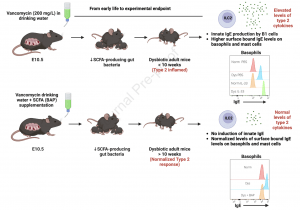Researchers have made a significant breakthrough in understanding the link between gut health and allergies. Their study reveals a specific chain of events that can lead to allergies and asthma, setting the stage for new prevention and treatment strategies (Figure 1).
The study focuses on the role of gut bacteria in shaping a newborn’s immune system. Antibiotics, often used to treat infections in newborns, can deplete certain beneficial bacteria. One such bacterium, known for producing butyrate, plays a crucial role in regulating immune responses.
Previous research demonstrated that infants with fewer butyrate-producing bacteria are more susceptible to allergies. They also showed that supplementing with butyrate early in life could mitigate or even reverse this susceptibility.
In this study, the researchers investigated how butyrate deficiency affects the immune system. They found that mice with depleted gut bacteria, who did not receive butyrate supplementation, developed significantly higher levels of ILC2 cells. These immune cells, implicated in allergy development, produce molecules that stimulate white blood cells to produce excessive amounts of certain antibodies. These antibodies can then trigger allergic reactions to harmless substances.
Butyrate must be administered within a specific window after birth to prevent the proliferation of ILC2s and the subsequent development of allergies. If this window is missed, the allergic response becomes irreversible.
The study’s findings offer new potential targets for treating allergies, even after the critical supplementation period has passed. By targeting ILC2 cells or the molecules they produce, researchers may be able to prevent or reduce allergic symptoms.
This breakthrough provides hope for developing more effective and long-lasting treatments for allergies. By addressing the root cause of the problem, rather than simply managing symptoms, researchers aim to improve the quality of life for individuals with allergies.
Journal article: Kabil, A., et al., 2024. Natalia Nayyar, Julyanne Brassard, Yicong Li, Sameeksha Chopra, Michael R. Hughes, Kelly M. McNagny. Microbial intestinal dysbiosis drives long-term allergic susceptibility by sculpting an ILC2-B1 cell–innate IgE axis. Journal of Allergy and Clinical Immunology.
Summary Stefan Botha











